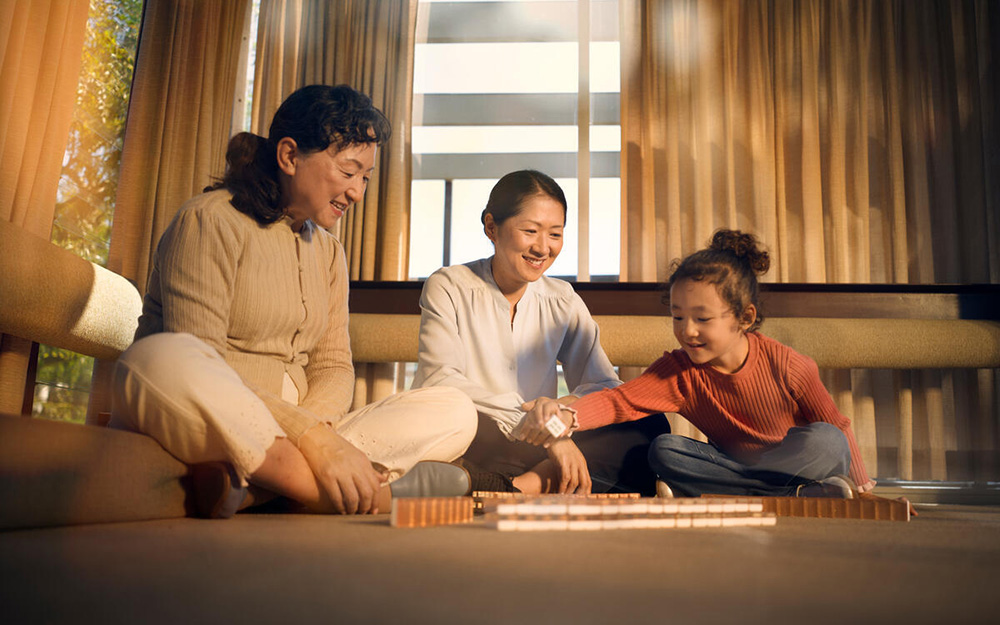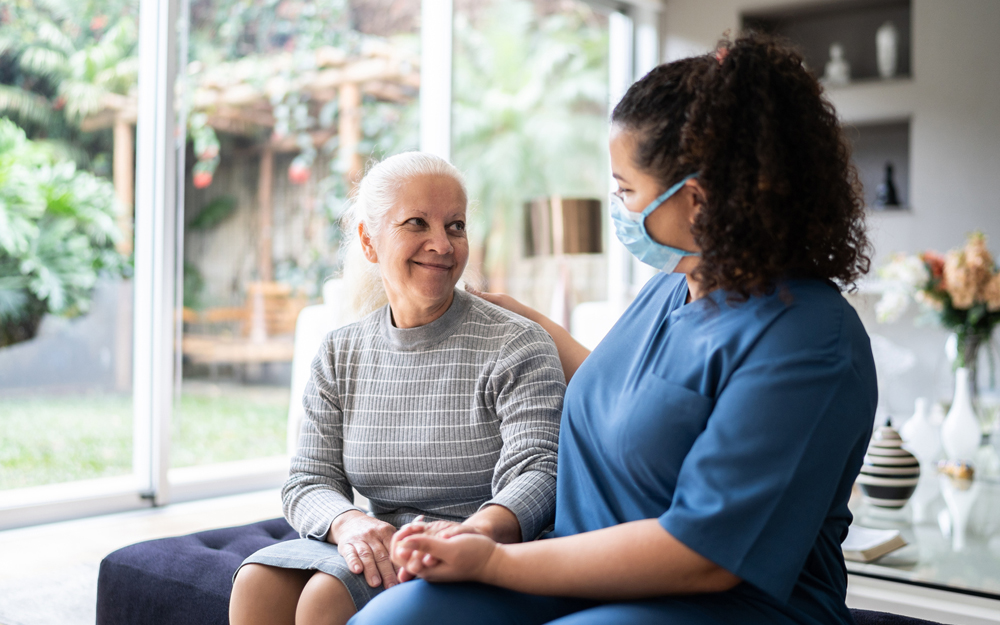Care Coordination for the Sandwich Generation
Date
October 28, 2024

Date
October 28, 2024
Credits
Medical providers featured in this article
In Brief
{{cta-block}}
Watching the parent who tied your shoes, sliced your bread and shuttled you to school suddenly need support themselves can be disorienting. So, too, can their demanding schedules—particularly if you’re also parenting. That’s the situation that around a quarter of U.S. adults now find themselves in.
The “sandwich generation” looks after both aging parents and growing children or dependents. As Baby Boomers age and live longer, their middle-aged children already spend roughly 50 hours each week caregiving. Families often must navigate a laundry list of chores, medications, chronic conditions and complications, as well as confront fears and thorny questions about quality and end of life—all the ebbs and flows that come with aging. Meanwhile, an 80-year-old parent’s cough can easily go unnoticed and land them in the hospital for weeks.
“The caregiving generation right now is getting blindsided. They just don’t expect when a parent’s condition might change or decline, or they don’t realize the amount of help that’s required,” said Eesha Chakravartty, MD, a Cedars-Sinai Senior Advantage program physician in Tarzana. “They might not understand how complicated their medication regimens are or how time-consuming a simple thing like driving a parent to all their appointments can be.”
{{providers}}
Senior Advantage, a recently launched Cedars-Sinai program, is partnering with “sandwich generation” families to better prepare them and walk them through the aging journey and to protect older adults through outstanding primary care.
“Senior Advantage is especially beneficial for, and is primarily focused on, patients who have chosen Medicare Advantage as their insurance option. The team can leverage those benefits and resources to provide truly comprehensive care,” said Cynthia Litt-Deculus, vice president and chief population health officer at Cedars-Sinai.
A Coalition of Caregivers
Cedars-Sinai’s Senior Advantage offers a comprehensive approach to caring for medically complex patients age 65 and older who are enrolled in Medicare Advantage plans. At its core is a designated:
- Primary care physician, focused on older adults
- Pharmacist
- Nurse
- Case manager
- Patient service representative, who assists with scheduling, insurance matters, answering questions, and providing support to patients and their care teams
Care team members meet weekly to discuss patients’ issues. They also carefully coordinate with Cedars-Sinai specialists, collaborating with cardiologists, endocrinologists, neurologists, nephrologists, urologists and surgeons. For example, to treat debilitating arthritis flares, they bring in orthopedists, pain management specialists and physical therapists.
Case managers bridge these connections and steer people in the right direction when multiple, overlapping illnesses make navigation unclear. They oversee patients’ overall health, checking in with them and watching for serious, subtle symptoms that can slip through the cracks, such as swollen legs or shortness of breath. If a patient is hospitalized, liaisons smooth those transitions.
The most important thing that you can do for your aging parent is make sure you have a medical team that you trust."
— Dr. Mary Norman
“It takes a village to care for an aging patient,” Chakravartty said. “Making sure that all care team members are involved at the right time is critical.”
From the beginning, the partnership tackles polypharmacy—the use of multiple medications. Aging adults often take a dizzying assortment of 10 to 15 medications across different regimens. Pharmacists closely assess patients’ prescription drugs and supplements, with an eye toward dosing, potential drug interactions, medication risks and unnecessary duplications. They also consider everyone’s treatment goals. Then, the team whittles down treatments, streamlining them into a more manageable, effective medication plan.
A consistently healthy, balanced diet is another type of medicine for the heart, gut and brain. A missed meal could be dangerous for a diabetic patient over 65. To reinforce its importance, Senior Advantage has a nutrition program. Registered dietitians guide patients on healthy eating habits and weight.
“In all of our interactions, we try to educate families on normal aging, disease processes and treatments, so they’re not caught by surprise or frustrated,” Chakravartty said. “The hope is that we can arm them with information to not only be aware of what is happening now, but also predict what might happen and plan for the patient’s future needs.”
Safety in Numbers
The sandwich generation, patients and doctors are often up against the same enemy: the clock.
A collaborative network affords more time for “head-to-toe” triaging to prevent avoidable complications, illnesses and hospitalizations, said Senior Advantage physician Mary Norman, MD, in Culver City. Visits are typically twice as long as a regular primary care appointment: one hour for new patients, with 40-minute follow-ups.
Physicians give vaccines and screen for cancer, hearing loss, balance and low bone density in an effort to stave off deadly falls and fractures. Dementia is another priority: Each patient is tested for cognitive changes and advised on a personalized brain health plan.
At home, the team provides devices to measure blood pressure and sugar (glucometers) that enable stronger, continuous monitoring. If glucose levels spike after a new steroid medication for back pain, you can sound the alarm before it leads to a trip to the Emergency Department.
“It facilitates an active dialogue,” said Leslie Ramirez, MD, a Cedars-Sinai Senior Advantage physician in Beverly Hills.
With caregivers stretched so thin, Cedars-Sinai social workers are another key safety net. In tandem with the California Department of Social Services In-Home Supportive Services, the team secures tools to help patients age safely in place, such as transportation to appointments, catheters and durable medical equipment. Patients can also access advanced care planning in primary care, providing an opportunity to clarify their end-of-life care wishes.
These resources provide families with much-needed peace of mind, according to Norman, and an “environment where your loved one has control over their health and is free to find true purpose.”
Team Building
Relatives are updated through My CS-Link, and caregivers can join medical appointments virtually from wherever they are. Don’t be afraid to speak up for your loved one at every stage or ask questions, experts encourage.
The process starts with choosing a primary care doctor to play quarterback.
“The most important thing that you can do for your aging parent is make sure you have a medical team that you trust,” Norman said.
For some, a Spanish-speaking practice such as Ramirez’s ensures everyone is on the same page.
“It’s not just patient-centered care,” Chakravartty added. “It’s really family centered.”
To make an appointment with Senior Advantage, schedule an appointment directly with Eesha Chakravartty, MD, Mary Norman, MD, or Leslie Ramirez, MD. For any questions, call Cedars-Sinai Medical Network Patient and Provider Services at 800-700-6424 or 310-385-3555, 8 a.m.-5:30 p.m., Monday-Friday.





